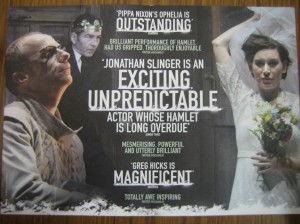This flyer comes from the Royal Shakespeare Company’s production of Hamlet. The quality of the production is not at issue here; Hamlet isn’t one of my favorite plays but I thought this was amazing and would see it again. I particularly enjoyed Jonathan Slinger’s performance – he starts out looking like a young banker who’s having a bad day on the markets, and then progressively goes nuts – as well as the masque at the end of the first act and the stormy supermarket lighting.
The point is the Twitter blurbs.
In between the newspaper quotes are bits of text attributed to “Twitter #RSCHamlet.” You might read the flyer without noticing the sourcing, and the typography certainly facilitates that. Naming #RSCHamlet implies that these reviews were posted using that hashtag. But I can’t find these quotes on Twitter under #rschamlet or rschamlet or even hamlet rsc, though there are a few nice things posted. The RSC has a blog post with Storified tweets, also complimentary but still not the ones in the flyer.
Searching for the words in the posts doesn’t locate them either: hamlet gripped, mesmerising brilliant (applied to Globe Theatre productions, Game of Thrones, and Andy Murray, but not this Hamlet), awe inspiring (overwhelming number of tweets about daredevils). Giving up on the last, I narrowed it to awe inspiring rsc and awe inspiring hamlet, figuring the RSC would have to have discovered the tweet by searching on some word relating to itself, but still didn’t find it.
Did these tweets exist and then disappear? People do delete tweets, delete accounts, and older tweets eventually become difficult to access. Still, my searches are turning up tweets that predate this production, so I have to conclude that either a) I am overlooking a way to search that someone will tell me about by e-mail (the comments are blocked till I find a good spamfighting widget); b) the RSC unluckily picked comments from three different people who weren’t committed to leaving a record, or c) these comments never appeared on public Twitter in anything like the form on the flyer. And if the Royal Shakespeare Company is posting sketchily attributed, untraceable comments in its advertising, where does that leave everyone else?
Separately, the economy of reviewing is a bit of a mystery to me, overall, and truth in reviewing seems to be on the decline. There seems to be a practice here and now of theatre owners and promoters offering free tickets in exchange for reviews “for the website.” I fail to see how any member of the public would not look at where they appear, class them as advertisements, and discount everything they say, though I understand that in these times people will write them. It’s not that I want publications to sit in judgment on the efforts of others, but as a member of the public I miss honest, unbribed reactions by my peers, especially my more experienced peers. That is why I try to resist blandishments to tweet this and like that – what Sree calls “SHARE THIS or we’ll shot this dog” – though one cannot escape them all, especially in a small town. Yes, it’s a more civil world than it was in the frontier days when “on-line” (sic) and “flamewar” were likely to be found in the same sentence. But if you make positive, public evaluation into a social obligation, how can you tell what people really want?
The RSC’s Hamlet is good, especially the title performance, and the eminent English professors I saw it with said afterwards it was splendid. And I’m not getting anything or even a chance of anything for saying that.

